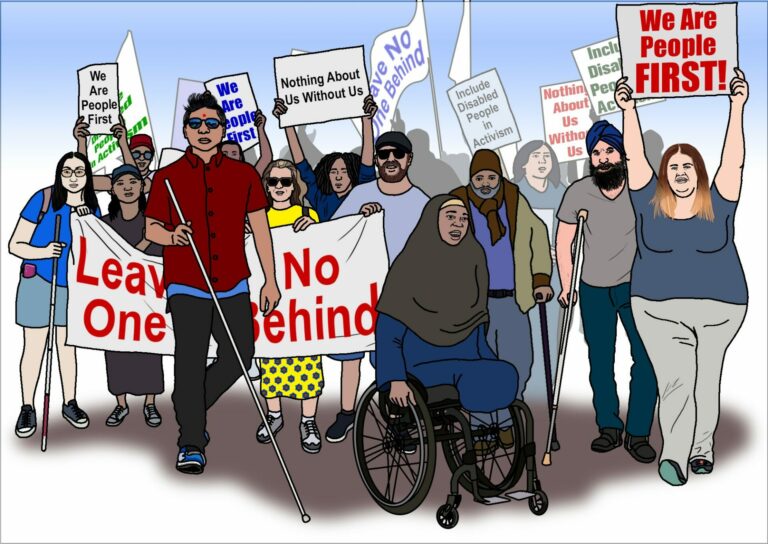
A year ago, we launched our guide “Strengthening the Inclusion, Protection, and Wellbeing of Human Rights Defenders with Disabilities”. Today, we take another step forward in accessibility by offering it in Spanish, French, Russian, and Swahili.
Nuestra guía “Fortalecer la inclusión, protección y bienestar de las personas defensoras de los derechos humanos con discapacidad” está también disponible en español, francés, ruso y swahili.
Notre guide “Renforcer l’inclusion, la protection et le bien-être des défenseur·e·s des droits humains en situation de handicap” est également disponible en espagnol, français, russe et swahili.
Mwongozo wetu “Kuimarisha Ujumuishaji, Ulinzi na Ustawi wa Watetezi wa Haki za Binadamu wenye Ulemavu” unapatikana pia kwa Kiswahili, Kifaransa, Kirusi na Kihispania.
Наше руководство “Усиливать инклюзию, защиту и благополучие правозащитниц и правозащитников с ограниченными возможностями” также доступно на испанском, французском, русском и суахили.
“Human rights defenders with disabilities have great potential to transform the way human rights is understood and enacted. Their unique perspectives of their contexts, their creativity, their ways of navigating challenges and solving problems, enrich the way communities respond to human rights violations and violence.”
Foreword by Gertrude Oforiwa Fefoame, Chair of UN Committee on the Rights of Persons with Disabilities
“[…] all of us must act together to ensure that our human rights movements are inclusive and diverse. We all need to recognise how ableism shapes our interactions, expectations, and participation in society.”
Foreword by Mary Lawlor, UN Special Rapporteur on HRDs
Together with the University of York and Durham University, Protection International has developed a guide on “Strengthening the Inclusion, Protection, and Wellbeing of Human Rights Defenders with Disabilities”.
For this guide, we conducted interviews, focus groups, and conversations in workshops with around 70 defenders with disabilities and protection actors. We collected the challenges and risks faced by human rights defenders with disabilities, and the kinds of practices that strengthen their security, protection, and wellbeing.
In this guide, we look at how ableism continues to shape decision-making spaces, processes, and expectations for participation in society. Furthermore, we highlight how defenders with disabilities continue to face significant challenges with accessibility, encompassing not only physical and communicative barriers but also challenges related to representative accessibility. HRDs need to be recognised and seen as persons who are relevant to participate – not dismissed, overlooked, or sidelined. Finally, we emphasise the importance of tailoring protection initiatives to the specific circumstances and contexts of HRDs with disabilities. It is essential to involve them and their representative organisations in the design and implementation of such initiatives.
All HRDs contribute meaningfully to shaping our societies and to making them more equal, democratic and just. We urge human rights movements to be more inclusive of defenders with disabilities. This requires all of us to:
This guide has been designed to enable access for persons with colour blindness or visual impairments. To access the text-only version of this document, please download the word version below. For any questions, comments or requests regarding accessibility, please contact ao@protectioninternational.org.
We would like to express our deepest gratitude to all those who contributed to this project: first and foremost, the 70 human rights defenders who made this report possible. Ms. Mary Lawlor, UN Special rapporteur on human rights defenders and Ms. Gertrude Oforiwa Fefoame, Chair of the UN Committee on the Rights of Persons with Disabilities, for their kind contribution to the foreword of this guide. And of course, Ford Foundation, SIDA, Oak Foundation, ProtectDefenders.eu, Durham University and the University of York, for their financial support to this project.